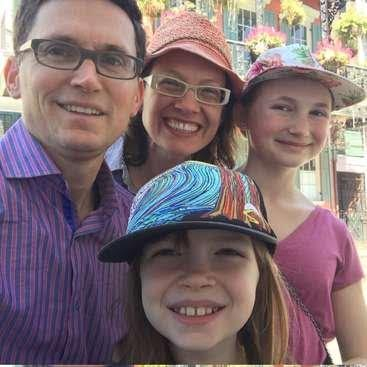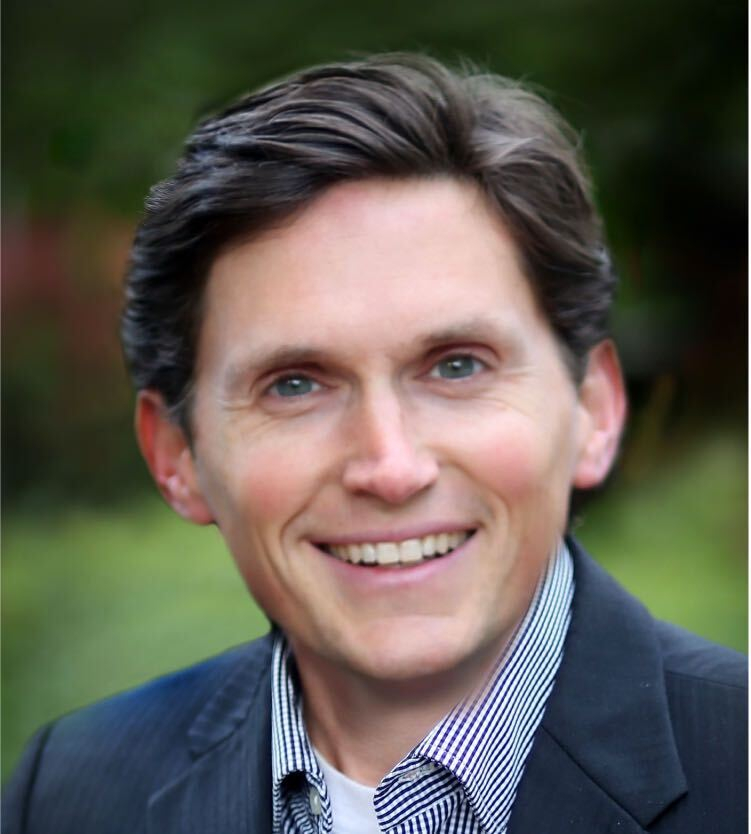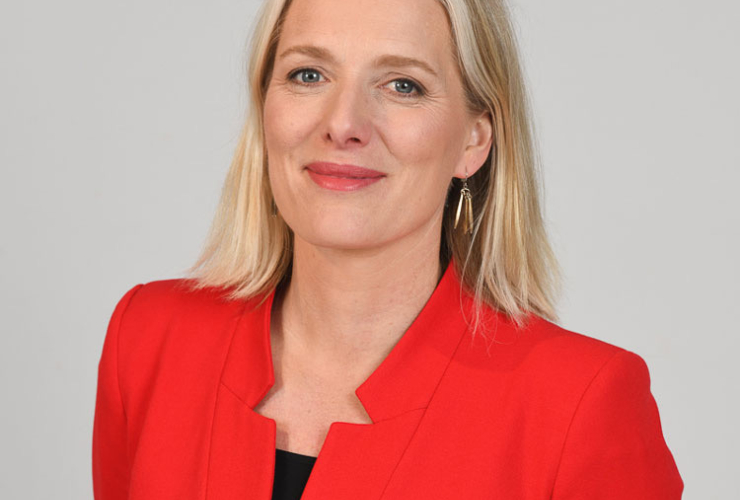The man who helped make Vancouver one of the world’s greenest cities is leaving. City Manager Sadhu Johnston announced his resignation today, citing a desire to spend more time with his family. This will bring to an end the tenure of a broadly trusted and admired City Manager, one who was a powerful influence in implementing Vancouver’s global climate action leadership, and made a mark nationally in Canada’s urban climate action awakening.
He leaves at a moment when Vancouver — a city with a $1.5 billion operating budget and more than 7,000 employees — is seen as a leader for its green initiatives, including the Greenest City Action Plan, carbon emission reductions, waste diversion programs, separated bike lanes, electric vehicle and car-sharing proliferation across the city, and capital projects such as the Burrard Bridge and the Killarney Seniors Centre.
"As City Manager, Sadhu has helped the City of Vancouver push forward many innovative and challenging initiatives that have helped Vancouver tackle critical issues, and none were as transformative to the City as the Greenest City Action Plan. You can't create systemic change without being able to completely reform how every single city department functions and works with one another. That's something pretty hard to do at the best of times, but this was in a complex government bureaucracy," Vancouver Mayor Kennedy Stewart told Canada's National Observer.
Johnston was the “35-year-old whiz kid who spearheaded Mayor Richard Daley’s ‘greening of Chicago’, according to The Chicago Sun-Times. He left his post as Daley’s Chief Environmental Officer, where he was responsible for the oversight of City’s environmental initiatives, in 2009. He joined the Gregor Robertson-led Vision Vancouver team in Canada shortly after Robertson’s election as Mayor, and later replaced Dr. Penny Ballem as the administrative head of the City. He immediately set about applying to Vancouver the same drive and unique perspective that he had applied in Chicago.
Design, plan, transform
For Johnston, managing a city is about more than the traditional functions of picking up garbage and fixing roads. It is about designing change. It is about setting an example. And, as he wrote in the book The Guide to Greening Cities, which he co-wrote in 2013 with other municipal leaders, “greening cities is all about making the case, building coalitions, breaking down silos, solving thorny problems, championing innovative and integrated solutions, and demonstrating performance.”
When Johnston signed on as city manager, he inherited a plan that perfectly reflected his own views on what cities can and should be. The Greenest City Action Plan was launched in February 2009 shortly before Johnston’s tenure began. Part of his mandate was to build and implement that plan, which was meant to put Vancouver on the path to being the greenest city in the world.
The plan is divided into 10 goal areas addressing three overarching areas of focus, which are:
- Zero Carbon
- Zero Waste
- Healthy Ecosystems
“The work over the last 11 years on The Greenest City was globally significant as evidenced by the numerous awards it's won," according to former City Councillor Andrea Reimer, who later became Deputy Mayor and is now Co-Chair, of the Climate & Energy Commission for the World Future Council. "It was made all the more so because Vancouver is the only city in the top tier of green cities that had to deal with a hostile federal government and an ambivalent provincial government for the majority of that time. It also finally broke the logjam in dozens of policy areas by being willing to set audacious goals and objectives, and being willing to fail tactically in order to learn, adjust the strategies and get to the goals.”
44 per cent increase in walking, 180 per cent in cycling
At the Garrison Institute’s 2011 Climate, Cities and Behavior Symposium, Johnston reflected on the changes he had seen and helped bring about. He said that Vancouver had “the lowest GHG emissions per capita in North America and talked about the ‘significant results’ the city achieved by replacing car lanes with bike lanes, making ‘it easy to walk around.’
“Seniors are saying it’s the first time I can bike downtown. And kids are doing it as well. At transit, we have 50,000 riders, and a 180 per cent increase in biking, a 44 per cent increase in walking and 50 per cent increase in public transit ridership.”
“You get an increase in jobs and a decrease in climate change. We are constantly in this field overestimating what we can do in a year and totally underestimating what we can do in ten.”
TransMountain pipeline pitted City against Feds
One of Johnston’s lasting contributions must certainly be the role he played in helping the City of Vancouver fight the expansion of the TransMountain pipeline, a fight that put it at odds not only with a huge energy company, Kinder Morgan, but also with the federal government. The legal battle raged for four years, ending in 2018 when the Federal Court of Appeal sided with First Nations and quashed Ottawa’s approval of the troubled Trans Mountain expansion project.
“The double-whammy decision against the Trans Mountain pipeline validates the strong concerns of the City of Vancouver and many others that Indigenous peoples were not adequately consulted — and marine impacts of oil tankers were ignored — in the federal review pipeline approval," then-Vancouver Mayor Gregor Robertson said, according to a National Observer article at the time. The project was later re-approved by the Trudeau government, and the Supreme Court of Canada later dismissed legal challenges by First Nations to block the project's construction.
"A great public servant"
Johnston will officially step down next January.
In his announcement letter to staff, obtained by Canada’s National Observer, Johnston explains he is leaving the job because "this role has taken my full attention, and has required sacrifices for me and my family. My daughters are growing up fast, and they have generously supported my work with the City, but now it's time to prioritize them."
Johnston concedes that his letter, which will be news to most people today, may come as a surprise because he is seen as a driving force behind the city’s green initiatives. And at the age of 46, he still has a long career ahead of him.
But at the end of the day, he says family won out.
Johnston had planned to leave in June, but then the pandemic intervened.
“I didn’t feel I could leave at a time with so much turbulence,” he says. “We had to find $160 million in our budget and temporarily layoff 2,000 staff. It was just a very, very difficult time for the city. It didn’t feel like (it was) the right time to leave. So, I did delay it based on that."
"A good public servant understands they have three constituencies - council, staff, the community," Andrea Reimer notes. "A great public servant is able to make all three of those constituencies understand and value each other. Sadhu's success at moving policy forward within the parameters Council sets is because he is a great public servant."
As he prepares to leave, Johnston took some time to talk to Canada’s National Observer about his legacy, and the challenges that cities such as Vancouver still face as the world struggles through the ravages of a pandemic and a possible second wave.
The following is an edited version of Johnston's conversation with Canada's National Observer Deputy Managing Editor, David McKie.
David McKie: Is Vancouver the greenest city?
Johnston: We are in certain areas, yeah. And in other areas we have work to do.
McKie: Give me an example that proves Vancouver is the greenest city.
Johnston: I think we’ve been global leaders in building a compact, walkable community that is transit-oriented. And I think that way we are real global leaders and have a lot to teach the world.
You can walk or bike around the city and you can generally get most of what you need in your neighbourhood. You don’t need a car. We have one of the lowest greenhouse gas emissions per capita for any city in the world. So, we are global leaders, but still have more to do.
McKie: Like what?
Johnston: Well, I think we have work to do in virtually every area. Reducing our carbon emissions. Reducing our waste. Producing more food locally. There’s definitely more work to do across the board.
McKie: Doesn’t the city’s climate make many of the achievements you’ve mentioned a lot easier?
Johnston: Yes, as does the source of electricity, because you can heat and cool your buildings with electricity.
McKie: You also mentioned carbon reduction in your announcement letter to staff. What role can municipalities play in helping to reduce the carbon footprint?
Johnston: It can play a significant role in the way that we regulate construction. What type of buildings are built? How energy efficient are they? Are they connected to district energy systems? Are they transit-oriented? A lot of our carbon emissions come from how we heat our buildings and our hot water. And the second is how we get around. Our ability to shape development is a core part of that. But we can also provide ways for folks to get around differently. And investments in car-sharing. Bike-sharing.
McKie: Are other cities following Vancouver’s lead in implementing a similar green action plan?
Johnston: Vancouver has been a global leader in some areas. And then we look to other places to learn from them. There are a lot of amazing things happening in other cities in the Lower Mainland, and then other cities across North America. And so it is a very, very robust area of work for cities, and I helped to create something called the Urban Sustainability Director’s Network, which is city staff in cities across North America working to address these issues.
We do a lot of sharing of information and experiences, what has worked and what hasn’t worked.Ultimately, there are leading practices, like in the American southwest, where there’s huge innovation around water conservation where we can really learn a lot, versus areas where we can provide a lot of experience around areas like dense urban development, transit-oriented communities and that sort of thing.
So, we have a lot to share and a lot to learn.
McKie: Are there other cities that Vancouver can emulate when it comes to reducing its carbon footprint?
Johnston: There are cities like Copenhagen that have done very interesting things around mobility and bike infrastructure. London, for example, is using waste heat from its subway system to heat houses. So, there are amazing lessons across the world.
There is innovation coming from all over the world. Cities are very vulnerable places to climate change. We need to take action and we have many of the tools that can have an impact.
McKie: Are a number of these cities within jurisdictions that are not climate friendly?
Johnston: You see oftentimes a change in a national government can drive a huge change in how they approach climate. You saw that in Australia a few years ago, and in the U.S. between (former U.S. president Barack) Obama and (U.S. President Donald) Trump. Generally speaking, you don’t see that kind of swing in cities. New York has been a leader on this issue for changing administrations, as has Vancouver, because people want this kind of thing and local governments are very responsive to what people want.
There’s a real benefit in our communities to better air and clean water ... better transportation infrastructure, more energy-efficient buildings. Local municipal government is very much closer to the people that way. And by doing these things, you can really improve quality of life. And people respond to that.
McKie: What are some of the green challenges still facing Vancouver that you were working on, but didn’t make as much progress as you would have liked?
Johnston: We had very ambitious goals for carbon reduction. We were able to see considerable reduction in our per capita greenhouse gas emissions between 2007 and 2019, there was about a 19 per cent reduction. Meanwhile, we had a very considerable growth in jobs and population. So, in many ways Vancouver has demonstrated to the world that you can grow your population and grow your economy while reducing greenhouse gas emissions.
McKie: So, what would be an example of something Vancouver could do that you were pushing for but couldn’t quite achieve?
Johnston: Probably energy retrofits (for) buildings… There are a lot of existing buildings with old boilers and many of those buildings are vulnerable. So, (it’s) figuring out how to create tools to get homeowners and building owners do energy retrofits and seismic retrofits. That stuff is expensive to do. You need to come up with innovative financing and programs to help building owners. I think we made some progress, but ... getting to the existing building stock has proven to be very challenging for Vancouver and other cities.
McKie: What makes it so challenging?
Johnston: Well, it’s expensive. If someone is coming in to build a new building, they have to get a building permit from us. So, we have an opportunity to make them build in an energy-efficient way. And the occupants of the buildings enjoy cleaner air and lower heating costs. But for an existing building, they’re not coming in for a building permit. We don’t have a chance to really work with them because they aren’t making upgrades.
McKie: What parting advice would you have for other city managers and politicians when it comes to reducing the carbon footprint?
Johnston: When you look at the amount of energy we’re putting into addressing COVID, which is a crisis, I would encourage all of us to not drop the longer-term crisis that we’re facing. We’ve seen cities that are reducing their investment in ... greenhouse gas emission reductions. Those are longer-term crises that we need to tackle, and I would encourage all of us to keep our eye on the ball.

Thank you Mr. Johnston for
Thank you Mr. Johnston for all that you have done for the City of Vancouver. You and Gregor Robinson have demonstrated to the world that you can address global warming, reduce emissions and create more friendly community orientated cities. Best wishes for creating what matters to you in the future.






Comments